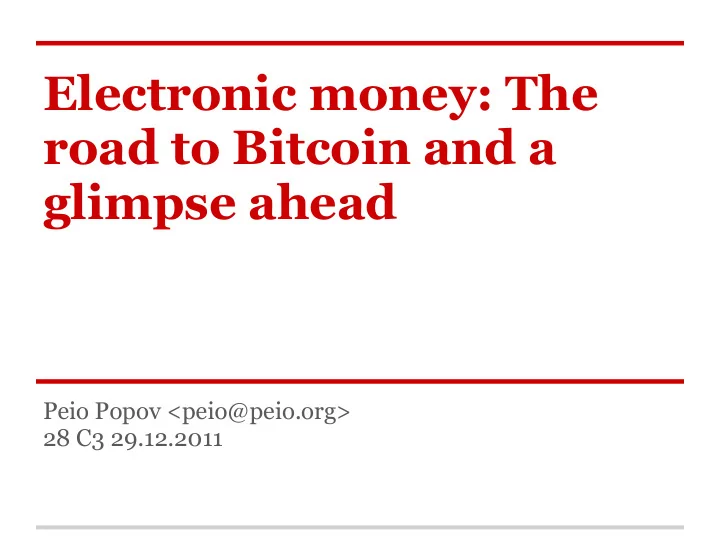

Electronic money: The road to Bitcoin and a glimpse ahead Peio Popov <peio@peio.org> 28 C3 29.12.2011
Pierre De Fermat The last useful lawyer:
Introduction ● What do I do? ● Why I find the topic important? ● What do I aim to achieve? ● Define a problem ● Propose solutions ● Ask for help ● Disclaimers and more disclaimers
Definition of Electronic money Electronic money is defined as monetary value which is: ● stored on an electronic device; ● issued on receipt of funds; and ● accepted as a means of payment by persons other than the issuer.
Alternatives to electronic money Working examples ● WIR ● Ven ● Der Chiemgauer ● Die Havelblüte ● Der Urstromtaler ● Der Sterntaler
Definition of the problem Money is hard and hard from various perspectives: ● Human ● Technical ● Legal/Political ● Business Each perspective imposes it's requirements to the geneal problem of electronic money.
Human perspective ● Identification and authorization ● Achieving consensus and easy dispute resolution in a group ● Determination of the state of the system at any given moment ● Trust
System risks Secure issuing and usage of electronic money ● Counterfeiting ● Double Spending ● Repudiation ● Secrecy and anonymity ● Purchase Order Modification (MITM) ● Denial of Service / Points of failure ● Failure to deliver, fraud risk ● Framing
Legal and accounting problems ● Entity requirements ● Settlement risk ● Counterfeiting accusations ● Money laundering and finance of terrorism ● Tax evasion prevention ● Consumer protection requirements ● Ways to negotiate and conclude a contract ● Auditability ● Reverse and chargeback transactions ● How the burden of proof is distributed
Why the legal part is important ● Money is a matter of trust, stability and predictability ● Opposition is expensive as you are funding the opponent. ● Solving the wrong problem? ● Regulation is immature and can be made better.
Feedback on the legality ● US - FBI 0n Liberty Reserve ● Deutche bank on Regiogeld ● Swiss national bank on WIR ● UK Financial Services Authority ● French Court ● Electronic Frontier Foundation
Costs ● Registration ● Operation ● Support ● Marketing ● Customer and merchant negotiation
The contribution of Bitcoin Six impossible things before Bitcoin ● Source of inspiration ● Decentralised ● Anonymous (relatively) ● No operational costs ● Open platform ● Marketing model included
Better issuing ● ID based ● Exchange for FIAT money or back by any other valuable stock (gold, land, silver); ● IOU credit/debit principle from the community currencies; ● Some fair (random) distribution as an alternative to: ● Proof of Work (as Bitcoin does)
Consensus in a more effective manner ● Can and should we consider any centralized authority? ● Is decentralised (trusted) backbone a ok compromise? ● Can a Trusted peers (OpenPGP alike) scheme of trust be applied? ● What social identification (friend of a friend) can contribute (Ripple project)? ● Can we rely on timestamping services? ● Is practical byzantine tolerance more effective than distributed timestamping? ● How triple accounting techniques may help?
Better anonymity ● Is complete anonymity possible? ● What are the achievable levels of anonymity? ● Can the user set a "mode" of a transaction, sacrificing some protection? ● Can you "escrow" your ID? ● Use dedicated layer (Tor) ● "Laundry" services (E-cache like) ● To what extend the existing bank secrecy will suffice? ● Role and knowledge separation (RBAC) ● Jurisdictional independence as a possible solution / significant contributor.
Reccomended reading 1. Micro Payment Transfer Protocol (http://www.w3.org/TR/WD-mptp) 2. Ben Laurie on Bitcoin (www.links.org/?p=1164) 3. US FBI on Liberty Dollar (http://www.fbi.gov/charlotte/press- releases/2011/defendant-convicted-of-minting-his-own-currency 4. UK FSA Statement on Bitcoin (https://bitcointalk.org/index.php? topic=49862.0) 5. EFF on Bitcoin (https://www.eff.org/deeplinks/2011/06/eff-and-bitcoin) 6. Triple Entry Accounting http://iang.org/papers/triple_entry.html)
Tell me how wrong I am
Recommend
More recommend